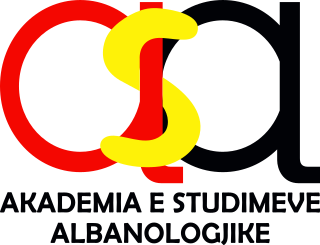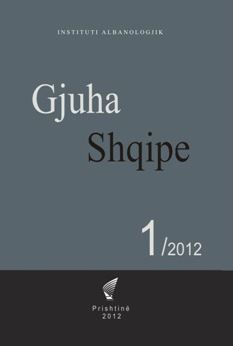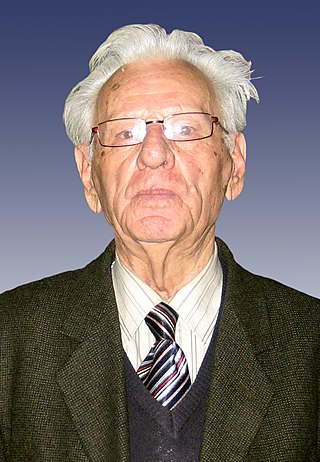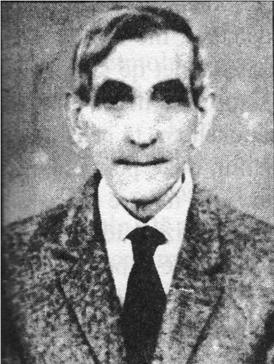
Moscopole or Voskopoja is a village in Korçë County in southeastern Albania. During the 18th century, it was the cultural and commercial center of the Aromanians. At its peak, in the mid 18th century, it hosted the first printing house in the Ottoman Balkans outside Constantinople, educational institutions and numerous churches. It became a leading center of Greek culture but also with elements of Albanian and Aromanian culture, all with great influence from Western civilization.

Eric Pratt Hamp was an American linguist widely respected as a leading authority on Indo-European linguistics, with particular interests in Celtic languages and Albanian. Unlike many Indo-Europeanists, who work entirely on the basis of written materials, he conducted extensive fieldwork on lesser-known Indo-European languages and dialects, such as Albanian, Arbëresh and Arvanitika; Breton; Welsh; Irish; Resian and Scots Gaelic.

Eqrem Çabej was an Albanian historical linguist and scholar who, through the publication of numerous studies gained a reputation as a key expert in research on Albanian language, literature, ethnology and linguistics.

The Academy of Sciences of Albania, founded in 1972, is the most important scientific institution in Albania. In the 1980s, several research institutes began at the University of Tirana were transferred to the Academy's jurisdiction. The institution includes the most distinguished scientists, also called "academics", that are involved in research centers and other organisations inside and outside Albania. As of 2009, the Academy had 23 regular members, 10 associated members, one permanent member, and 26 honor members.

The Epitaph of Gllavenica is a 14th-century epitaph, written on a shroud, and embroidered by a monk named Savia from Ballsh, Albania. Its name stems from the ancient name of Ballsh. The shroud is made of silk, linen and gold, and symbolizes the burial cloth of Jesus, used in Orthodox Good Friday's processions.

Zadrima is an ethnographic region situated in north-western Albania between the cities of Shkodra and Lezha, located left of the Lower Drin which eventually drains into the Adriatic Sea from near Lezha.
Selman Riza (1909–1988) was an Albanian linguist and Albanologist. Riza was one of the founding members of the Albanological Institute of Pristina in 1953.

The Academy of Albanological Studies is the main institution of albanology in Albania.

Studime Filologjike is a scientific magazine on Albanian language and literature, published by the Centre of Albanological Studies. It publishes linguistics studies, literary historical studies, old texts, resumes of scientific work on literature criticism and linguistics, etc.

Gjuha Jonë is a magazine published in Tirana, Albania, focusing on the standard and literary Albanian language. It is published by the Centre of Albanological Studies. Its main functions consist of enlarging the functionality of the standard Albanian language and elevation of its social prestige, the educational system and staff, strategies on augmentation of press organs and publishing media, and increase of the researchers in the linguistics field.

Albanological Institute of Pristina, Albanian: Instituti Albanologjik i Prishtinës or Instituti Albanologjik - Prishtinë, is the main Institute of Albanology in Kosovo. It is an independent public institution. Together with the Centre of Albanological Studies in Tirana, they represent the core scientific research centers on Albanology.

Gjuha Shqipe (Gjuha Shqipe is a scientific magazine published in by the Albanological Institute. It focuses on topics related to the Albanian language, its purification, spread, and development, and possible changes on its standard form.

Gjurmime albanologjike is a scientific magazine published by the Albanological Institute of Pristina, in Kosovo. The first issue came out in 1962 and since then has been a major contributor to all albanology fields study. The contributors come from Kosovo, Albania, other Albanian populated areas in the Balkans, as well as some Arbëreshë.
Francesco Altimari is an Italian scholar in the field of Albanology. He is honorary member of the Academy of Sciences of Albania (2006), external member of the Academy of Sciences and Arts of Kosovo (2008) and full professor (1991) of the Albanology section of the University of Calabria.

Androkli Kostallari (1922–1992) was an Albanian linguist and scholar. He was one of the central figures of the Albanian language studies and founding member and director of the Albanian Institute of History and Linguistics, and later Institute of Linguistics and Literature. Kostallari is remembered for being one of the key expert contributor to the present Albanian language orthography established by the Congress of Orthography of 1972.

Idriz Ajeti was an Albanologist from Kosovo and one of the main researchers and authorities on the Albanian language studies of post World War II. He was involved for a long period in the academic life of the University of Pristina, and was a member of the Academy of Sciences and Arts of Kosovo, being its chairman for seven years.
Marenglen Verli is an Albanian historian and scholar. Since 2009, he is a member of the Academy of Sciences of Albania.

Tahir Nasuf Dizdari was an Albanian orientalist, folklorist, and scholar. He was the main orientalist in Albania, and contributed in identifying and studying oriental words borrowed from Albanian.
Ujmir is a village in Klina municipality, Kosovo. It is located south of the Klina River.















